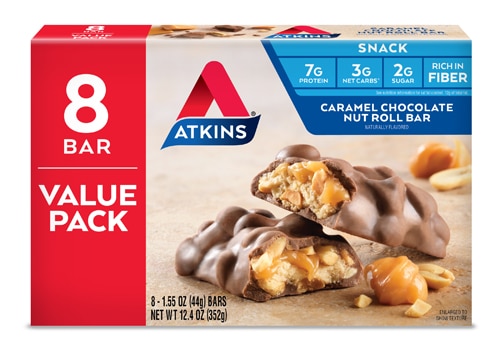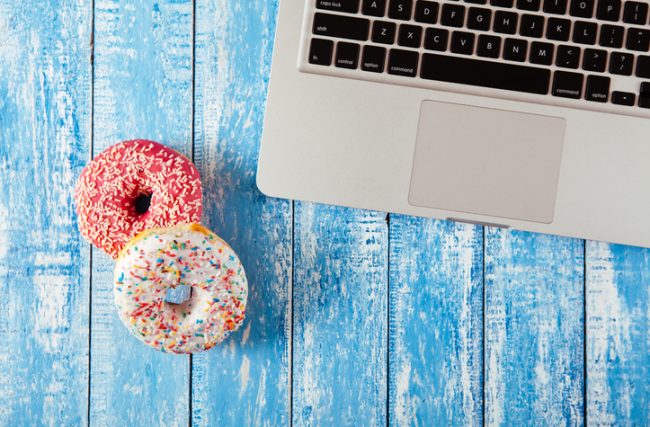The 9-5 grind isn’t for the faint of heart. The sedentary nature of sitting at a desk, the tension that creeps into your neck, the compulsion to eat sugar and drink caffeine for energy—all can be taxing on the body, mind and spirit. Add to the fact that a quarter of American workers consume an additional 1,300 calories per week in the workplace and it’s no wonder that “the Google 15” has transcended companies.
But eating at work doesn’t have to mean noshing on donuts near the coffee maker or turning a large pizza into a mid-day snack just because your office mate has the metabolism of a teenager. Rather, a little prep time and a dose of mindfulness can keep your weight in check and ensure you’re getting your daily nutritional requirements. Here are 5 ways to eat healthier at your second home—and why it can be a boon for your productivity:
1. Kickstart your metabolism
Eating a healthy, protein-rich breakfast has become common knowledge—but how many of us realize the importance behind it? Research put out by The Mayo Clinic indicates that breakfast-eaters experience increased concentration and more verve when it comes to engaging in physical activity. They also make smarter dietary choices throughout the day—after all, they don’t find themselves in that ravenous state that makes a plate of sour cream and cheese-topped tacos seem irresistibly delicious.
While an ideal breakfast is comprised of protein, organic produce, and complex carbs—such as an egg and avocado on top of multigrain toast—even a smoothie or low-glycemic breakfast bar can inspire sounder decisions later on, while giving you the brain power you need to muscle through that morning conference call.
2. Stay hydrated
That 3 p.m. dip in output and enthusiasm may not be due to a lack of caffeine (nice try)—the fatigue, dizziness and “brain fade” that accompanies it may actually be due to dehydration, particularly if you’re powering through an especially-challenging day on Starbucks and vending machine sodas. Invest in a good, BPA-free water bottle (some water bottles are so chic that they will match even the trendiest of office wardrobes) and aim to refill it at least three times a day.
Craving something different? Avoid sugary drinks—which can make blood sugar levels spike and then collapse—and opt for a bottle of Perrier or green tea. The latter—deemed a “brain food”—contains L-Theanine, an amino acid that naturally supports calm (thereby rendering you resilient enough to deal with your boss’s demands)
3. Snack happy
While snacking with abandon may be a recipe for weight gain, eating small amounts of food between meals (or more snacks to comprise meals) can help stave off distraction by encouraging blood sugar regulation and keeping your mind happily nourished (food for thought: your brain takes up roughly twenty percent of the calories you consume). But instead of raiding the vending machine or your company’s supply of processed goodies, keep your own healthy snacks on hand.
A few smart choices: organic apples, air-popped popcorn topped with olive oil and sea salt, 100-calorie packs of cashews or almonds, and hard boiled eggs. Convenient and versatile, this delightfully un-processed source of protein is rich in vitamin B12, which aids in the process of turning calories from food into energy. And if you are eating fruit like apples, peaches and pears, keep their peels on: Fruit skin is packed with fiber, which can help you feel sated for longer.
4. Learn the art of saying no
According to a recent federal survey, those extra 1,300 calories obtained at work are due in part to the prevalence of cookies and brownies that make their way into the office, whether it’s someone’s birthday, a promotion, or simply a sweet soul who likes to show her affection by baking for her colleagues. Whatever the case may be, indulging in office treats isn’t part of your job description.
What’s more, The Huffington Post reports that mounting evidence demonstrates that high levels of sugar—meaning that office brownie—is bad for more than “our waistlines and heart health”: it “can also have a negative effect on brain health—from cognitive function to psychological well-being.”
It also creates a vicious cycle, increasing cravings for more of the sweet stuff by “hijacking the brain’s neuropathways,” says neuroscientist Jordan Gaines. While you may receive peer pressure (“But Kathy landed the Anderson account!”), keeping your eyes on your resolution—to hit the gym after work, to reduce sugar and carbs—ought to help you resist. And who can argue with a polite but assertive no thanks?
5. Pack a lunch that would make Rachael Ray proud
This doesn’t mean to suggest you need to make a pot of Florentine penne with chicken and artichokes in a garlic béchamel sauce (although that does sound mighty good, doesn’t it?). It does, however, suggest you should pack lunches that you’ll be excited about—which will not only help in defying the temptation for the office’s supply of M & M’s and corn chips, but will also ensure you know precisely what you’re eating (and perhaps keep you from running to the nearest deli for a pastrami sub when hunger comes thundering).
Numerous websites abound with simple, healthy, and tasty recipes you can make in advance; a few solid options include tuna salad stuffed into a gluten-free or whole wheat pita and topped with tomato and arugula; a kale salad with feta, cucumbers, radishes, and baked tofu; and savory overnight oats with Brussel sprouts, sweet potatoes and a dollop of tahini.
Too slammed to plan ahead? Keep a bottle of homemade salad dressing at work (try a mix of olive oil, balsamic, lemon and Dijon mustard) and make that trip to the deli work in your favor: Order a Greek salad with extra cucumbers and a side of grilled chicken. The limited carbs will save from hitting that mid-day slump, while the amino acids in the protein will bolster your alertness until you’re ready to wrap up. In which case, why not treat yourself to a walk to undo that neck tension that’s crept up?




